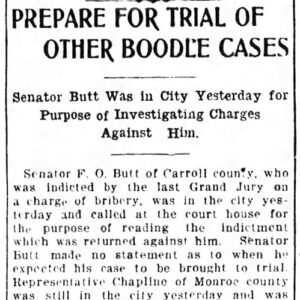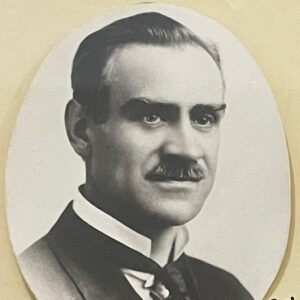calsfoundation@cals.org
Festus Orestes Butt (1875–1972)
Festus Orestes Butt was an Arkansas politician, attorney, judge, and banker who served in a variety of elected offices throughout his career but was probably most well known for his involvement in a bribery scandal surrounding the construction of the Arkansas State Capitol.
Festus O. Butt was born to William Alvin Butt and Anne Maria Weaver Butt near Lovington, Illinois, on February 3, 1875. His father was a farmer and Civil War veteran of the Union army, and his mother was a homemaker. The family moved to Carroll County, Arkansas, in 1886. Butt attended high school in Harrison (Boone County) and, at age seventeen, began teaching and reading the law under W. F. Pace. In 1896, Butt was admitted to the bar and elected to the Arkansas House of Representatives as a representative for Carroll County. Butt would serve two terms in the Arkansas House of Representatives, from 1897 to 1900.
Butt married Essie Mae Cox on May 21, 1901, and they had seven children. In 1902, Butt was elected to the Arkansas Senate to represent Carroll and Madison counties; he would serve in the Senate from 1903 to 1906.
In 1899, the Arkansas General Assembly had approved the construction of a new state capitol building, and in 1905, the project was over budget and far from complete. During the 1905 session of the Arkansas General Assembly, an appropriation bill for an additional $800,000 for the construction of the new capitol building came before the state Senate. The firm of Caldwell and Drake was the contractor for the project and, eager to have the appropriation succeed, gave $17,000 to a lobbyist to ensure its passage. A portion of these funds were used to bribe legislators to vote for the legislation. Lewis Rhoton, the prosecuting attorney for Pulaski County, obtained evidence that bribery had occurred during the 1905 legislative session, which became known as the “Boodling case” in the press. Several legislators were implicated in the bribery case, including Butt. In August 1906, Butt was convicted of bribery for giving state Senator Reuben R. Adams $100 to vote for the state capitol appropriation. Butt was sentenced to two years in the state penitentiary and fined $200. Butt appealed his conviction to the Arkansas Supreme Court, but the court affirmed his conviction.
Butt’s prison sentence began on January 1, 1907. There was widespread public support for pardoning Butt, and a petition with more than 8,000 signatures in support of such a pardon was delivered to Acting Governor X. O. Pindall. On June 27, 1907, Pindall pardoned Butt.
Butt resumed practicing law after his pardon and, in 1911, resumed his political career when he successfully ran for mayor of Eureka Springs (Carroll County); he served two terms. He was appointed as a delegate to the 1917–1918 Arkansas Constitutional Convention, and in 1926, was elected to his old state Senate district and served two terms (1927–1930).
Butt was also involved in banking and served as an executive officer at the First National Bank of Eureka Springs (later reorganized as the First State Bank of Eureka Springs), the First National Bank of Green Forest (Carroll County), and Peoples Bank in Berryville (Carroll County).
In 1943, Butt was appointed judge to the Thirteenth Chancery Circuit to fill the vacancy created by his son, Judge John K. Butt, who left the bench to serve in the U.S. Navy during World War II. Butt served as judge until 1944.
In 1970, Butt was named dean of the Arkansas Bar.
Butt died on June 30, 1972, in Fayetteville (Washington County) and is buried in Eureka Springs.
For additional information:
Butt, Judge Thomas F. “The Washington County Courthouse.” Arkansas Lawyer (October 1975): 125–126. Online at https://issuu.com/arkansas_bar_association/docs/october-1975 (accessed April 16, 2024).
Butt v. State, 81 Ark. 173, 98 S.W. 723 (1906).
Ex Parte Butt, 78 Ark. 262, 93 S.W. 992 (1906).
Herndon, Dallas T. The Centennial History of Arkansas, vol. 2. Chicago: S. J. Clark Publishing Company, 1922.
Historical Report of the Secretary of State 2018. Little Rock: Arkansas Secretary of State’s Office, 2018. Online at https://www.sos.arkansas.gov/uploads/education/2018_Historical_Report.pdf (accessed April 16, 2024).
Ledbetter, Calvin R., Jr. “The Constitutional Convention of 1917–1918.” Arkansas Historical Quarterly 24 (Spring 1975): 3–40.
Treon, John A. “Politics and Concrete: The Building of the Arkansas State Capitol, 1899–1917.” Arkansas Historical Quarterly 31 (Summer 1972): 99–133.
Willis, James F. “Lewis Rhoton and the ‘Boodlers’: Political Corruption and Reform during Arkansas’s Progressive Era.” Arkansas Historical Quarterly 76 (Summer 2017): 95–124.
John Ahlen
Little Rock, Arkansas
 Early Twentieth Century, 1901 through 1940
Early Twentieth Century, 1901 through 1940 Politics and Government
Politics and Government Boodle Indictment of Butt
Boodle Indictment of Butt  Festus O. Butt
Festus O. Butt 




Comments
No comments on this entry yet.